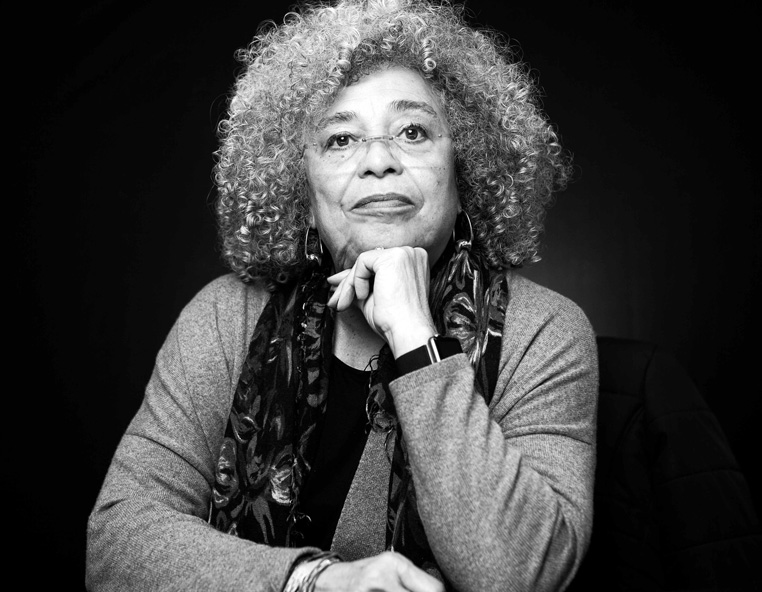
An icon of resistance, Angela Davis spent more than 90 minutes in conversation with students on March 23, reflecting on a half-century devoted to fighting for racial and social justice. Her message to the next generation of changemakers: “Do the work,” and remember that progress requires patience.
“You must take the long view. Think about those who struggled against slavery. Think about the Indigenous people who challenged the genocide. Think about the fact that people have been resisting forever, and sometimes it feels like it’s not having an impact. But if it had no impact, we wouldn’t be gathered here today,” Davis told the capacity crowd of several hundred in Kerwin Hall. “We are here by virtue of the fact that people did the work even when they were exhausted, even when they thought it wasn’t having an impact.”
Once among the FBI’s Most Wanted Fugitives, Davis—distinguished professor emerita in the history of consciousness department at the University of California, Santa Cruz—is now one the most influential voices advocating for the abolition of prisons and police. It wasn’t a call she expected to gain much traction in her lifetime—until the historic events of 2020.
“Suddenly, the set of circumstances arose in which people finally began to get it. There was an awareness of structural racism in relation to the health care system and [a realization] that Indigenous people and people of color were those who suffered most,” Davis said of COVID-19.
“Then, [amid] that growing collective awareness, we experienced the police lynching of George Floyd and the murder of Breonna Taylor. Something clicked, something began to make sense—people finally realized that the structures and the institutions in the system [are to blame]. That trajectory was created by the fact that there were so many people who were willing to do the work, to do the organizing, to have the conversations.”
Davis grew up “during a period of utter segregation in the most segregated in the South”—Birmingham, Alabama. She joined the movement at age 11 when she participated in an interracial discussion at her father’s Episcopal church.
“And then the Ku Klux Klan found the church. That was one of many bombings in Birmingham. You know about one [in 1963 at the 16th Street Baptist Church], but you don’t know about all the others,” said Davis, who lived in a neighborhood dubbed Dynamite Hill for the more than 40 unsolved bombings over two decades aimed at keeping middle-class Black families out. “That was when I was 11, and I’m going to turn 80 next year. And I have never considered not doing this work.”
Reflecting on her own experience, Davis— who joined the Black Panthers and an all-Black branch of the Communist Party as a young woman—said one of the keys to longevity as an activist is “getting involved in an [authentic] way that captures your imagination.”
“I really don’t identify with the image that has been produced of me,” said Davis, who was labelled a “dangerous terrorist” by President Richard Nixon in 1970, following her arrest for capital murder—charges for which she was acquitted two years later. “I consider myself a revolutionary—but not the revolutionary that was depicted by the media. I think of myself as a quiet person. . . . I just found a way to use my talents and skills to further the struggle for liberation.
“Involvement in social justice struggles has [often] been represented as this path that requires you to do certain things; you have to be willing to go to all the meetings, for example,” she continued. “Some people like that, but if you’re someone who loves poetry or writing, figure out a way to use that. I love reading, I love writing. All of us are fulfilled by different kinds of things, and I would suggest you figure out your own passion—figure out what you love doing and use that as a way to get involved in the movement.”
During the event, sponsored by the Kennedy Political Union, Students for Change, and Students for a Just Society, Davis also encouraged Eagles to “protect your peace and take care of yourself, especially when you’re doing this work that is so intentional and so exhausting.”
She said joy is an act of resistance and that one of the places she finds hers is music.
“What Black people have done is resist—and in the process of resisting, they have created beauty, they have created music. If you wonder why Black music is known by people everywhere in the world, it’s because it’s a music of freedom,” Davis said.
“You will find me at jazz concerts all the time. I love hip-hop too, because I realize that each era has its music, and we have to be aware and understand the relationship of the music to the age that produced it. I realized a long time ago that if I wanted to understand what was happening with young people, I had to develop a way to appreciate hip-hop. Even though at first it wasn’t what I was drawn to, I got on the stationary bike and listened to hip-hop,” continued Davis, who named Kendrick Lamar and Lizzo among her favorite contemporary artists.
She concluded her conversation with KPU executive director Kydira Garfield, SOC/BA ’25, by challenging students to “reflect on what it might mean to produce joy in the process of engaging against the kind of repression that represents the worst of humanity.”
“This is the way I’ve learned how to inhabit the world. I don’t think of it as exceptional. I think of it as something everyone can do, because we all have to be involved in efforts to transform our world. . . . Yes, it’s idealistic, but what’s wrong with idealism?”